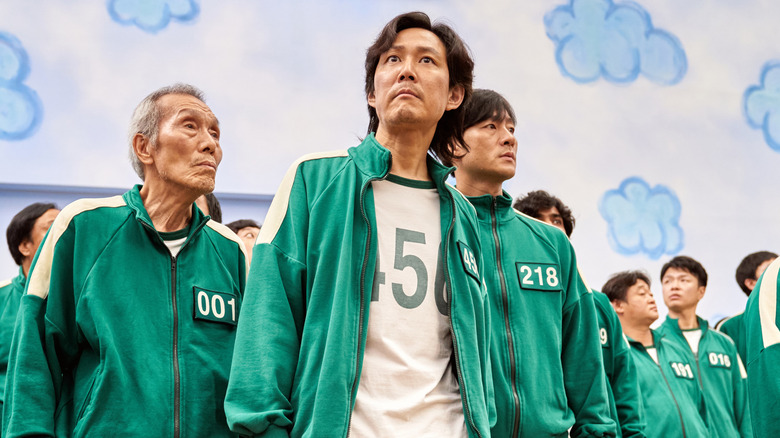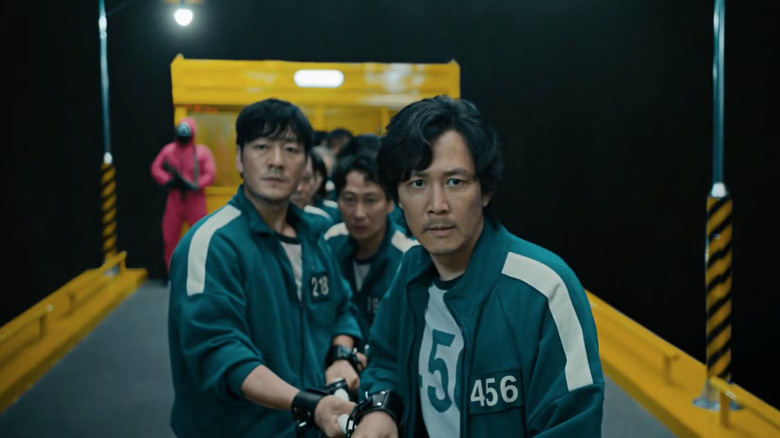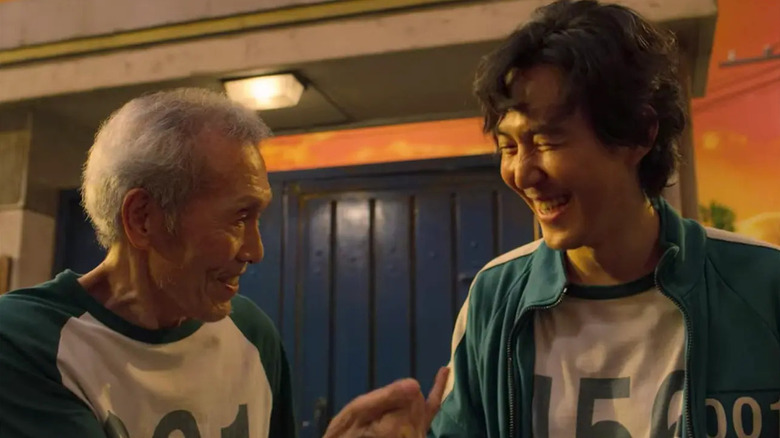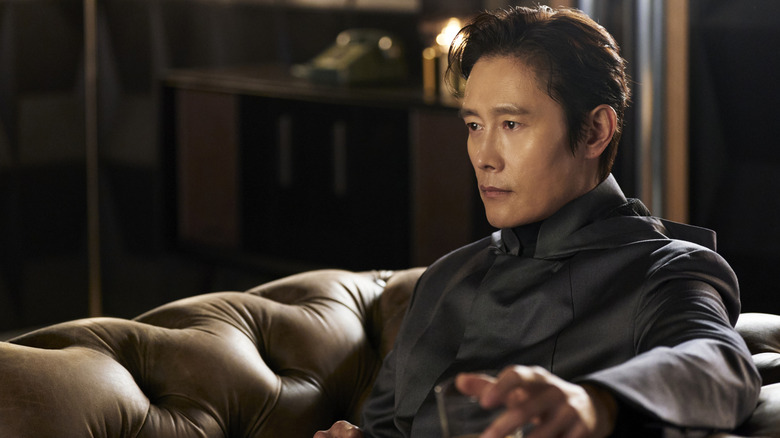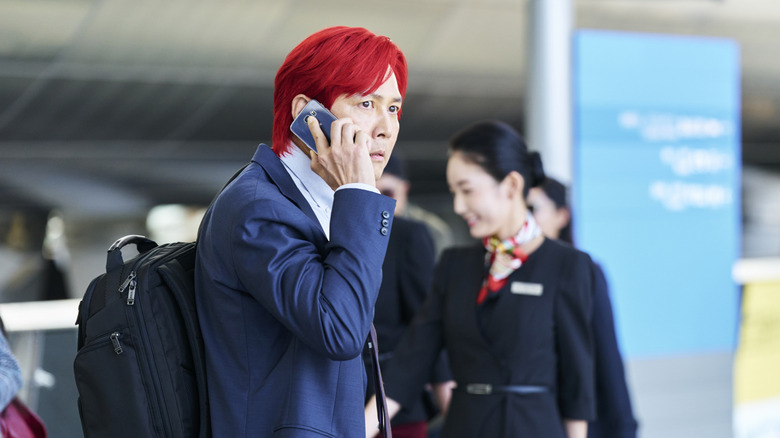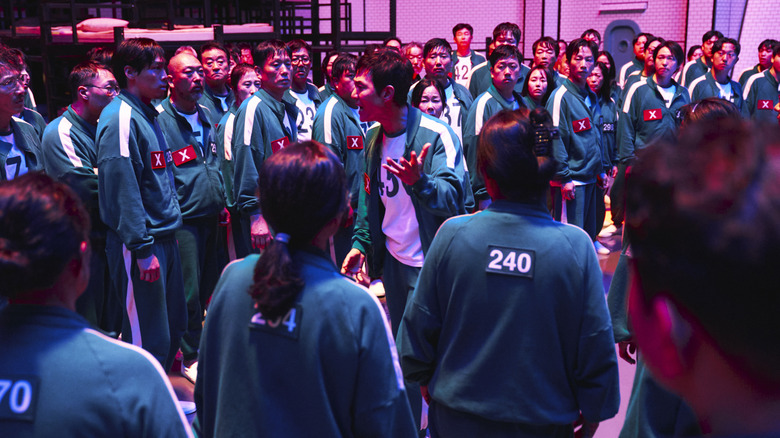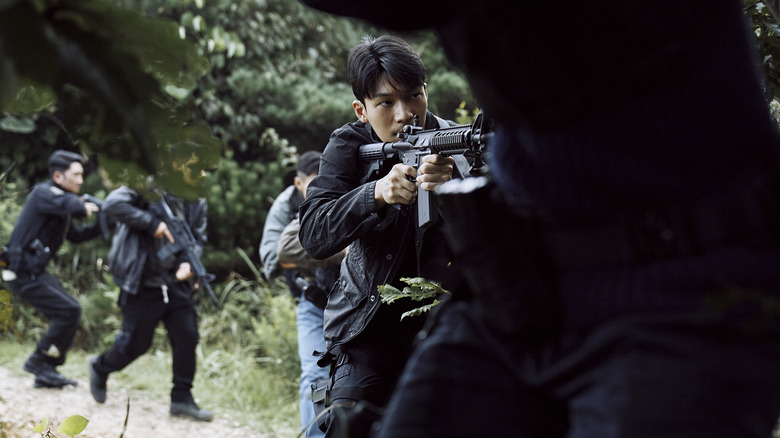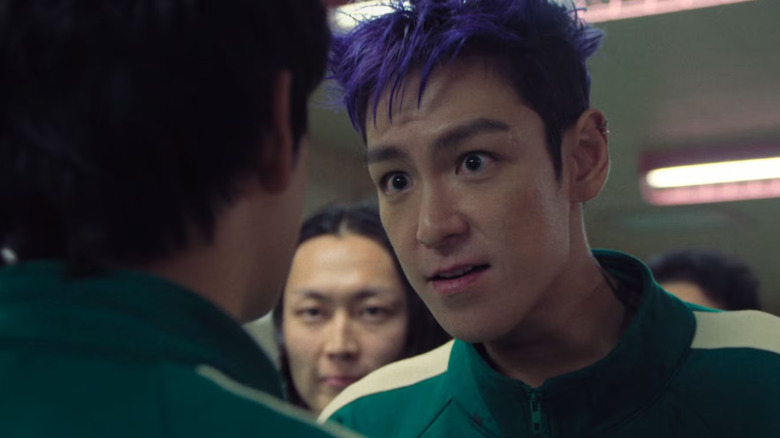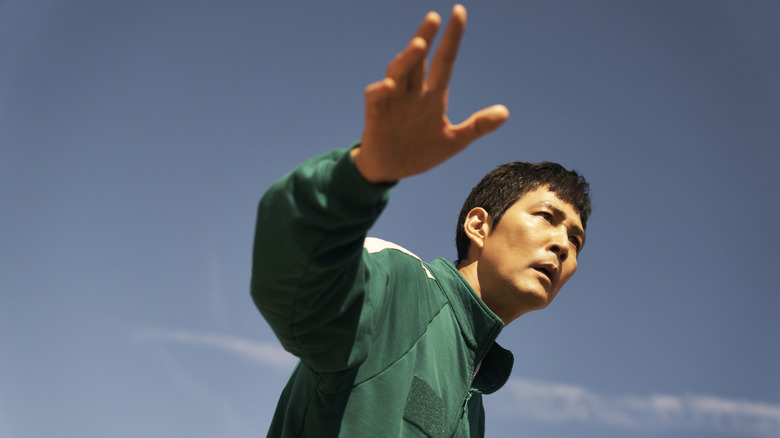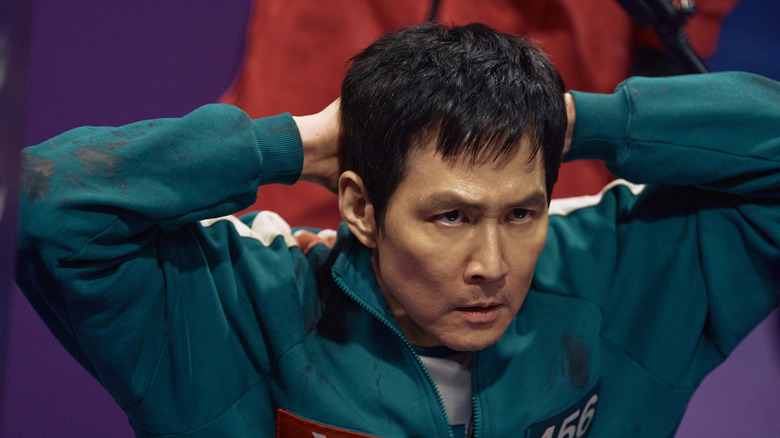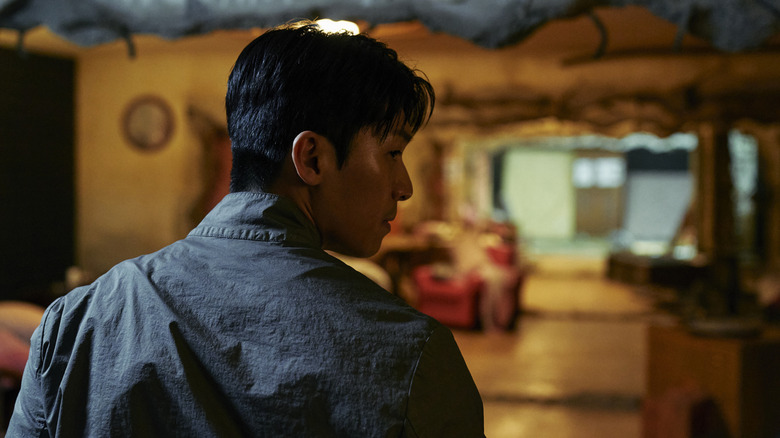The Biggest Plot Holes In Squid Game
"Squid Game" is, if nothing else, a wild ride — and when the second seasond dropped on Netflix at the end of 2024, fans got to watch Lee Jung-jae return as Seong Gi-hun, the winner of the games seen in Season 1 who decides to try and shut down the massive operation from the inside out this time around. (Whether or not this works is still up in the air, as Season 2 ends on a major cliffhanger; Season 3 is expected to drop on the service sometime in 2025.) Still, even the most diehard "Squid Game" fans must admit that, amidst the show's crazy twists and turns, there are also some major plot holes and inconsistencies.
In the dystopian world crafted by showrunner Hwang Dong-hyuk, everything is heightened as Gi-hun and his allies within the game desperately try to stay alive (and as, outside of the game, Wi Ha-joon's Hwang Jun-ho tries to figure out precisely who's running the game and where the massive compound that houses it is even located), but all of that heightening leads to some narrative issues along the way. Here are just some of the major plot holes and problems found throughout both seasons of "Squid Game," from outright cheating to weird hair dye to contraband possessions found within the game itself.
Player 001 could have died during the Tug of War game (Season 1)
During the first season of "Squid Game," we follow Gi-hun during his first experience in the game and watch as he aligns himself with Oh Il-nam (O Yeong-su), an elderly man sporting the player number 001. The big twist in the season finale is, of course, that Il-nam — who tells Gi-hun that he's in the game solely because he has a terminal illness and would prefer to die there rather than out in the "real world" — is the creator of the game, constructing it as entertainment for people like him (specifically, bored rich people). So what's the problem here?
The problem here is that Il-nam could have easily died in one of the original season's games — specifically, Tug of War, which took place on an extended walkway and resulted in half of the remaining players falling into the abyss when they didn't tug hard enough. That game was a total crapshoot, and Il-nam's chances of dying in it were at least half-decent; why would he and the other people behind the games take that risk?! Sure, we learn that the terminal illness was all too real, but that still doesn't really track, particularly because of the way that Il-nam exits the game shortly after Tug of War.
Il-nam helped Gi-hun win his game (Season 1)
After Gi-hun's team, which happens to include Il-nam, wins Tug of War, the players prepare for their next game, which turns out to be a marble game. Players must team up and choose literally any game played with marbles, and based on all of the rest of "Squid Game," you can probably guess what happens to the person who loses — they're shot by the guards, leaving the winning player to keep competing. (The fact that they're playing against each other isn't disclosed when people team up, meaning that people choose to work with their friends and are punished for it.)
During the marble game, Gi-hun takes pity on Il-nam when nobody else chooses to pair up with the older man; throughout it, Il-nam seems to be experiencing some memory issues as if he's suffering from an ailment like dementia. This allows Gi-hun to basically take advantage of Il-nam's confusion and win the game. Though Il-nam obviously isn't shot to death by the guards — he's "shot" off-screen and reappears to tell Gi-hun the truth in the season finale — his choice to let Gi-hun beat him is seriously confusing. Did Il-nam basically rig the game, in that moment, to ensure Gi-hun would win? Why? Was he just tired? Unclear!
Why is In-ho, a former player, the host of the whole thing? (Season 1)
There's another surprise reveal at the end of the first season of "Squid Game," and it concerns Jun-ho — who manages to infiltrate the massive compound where the game takes place to try and find his brother, who he thinks may have been killed in a previous iteration of the competition. After masquerading as one of the masked workers in the games, Jun-ho makes a genunely shocking discovery: the high-ranking masked Front Man, who clearly engineers everything that happens throughout the game, is his missing brother, Hwang In-ho (Lee Byung-hun) — and In-ho won the game at one point. In-ho tries to get Jun-ho, a detective, involved with the sinister operation, but when Jun-ho refuses, In-ho shoots his brother in the shoulder; early in Season 2, we learn that Jun-ho spends months in a coma as a result.
So why does In-ho do this? Why would a former winner of the barbaric games seen in "Squid Game" elect to run the whole thing? Not only does this not make a whole lot of sense — aside from the fact that it's a huge twist — but it only gets weirder in Season 2 when In-ho does exactly what Il-nam did and joins the game as Player 001. There's actually no reason given as to why any of this happens at any point, which makes it all feel absurd.
Why did Gi-hun ever have red hair? (Season 1)
When we get our final glimpse of Gi-hun at the end of "Squid Game" Season 1, he's heading to the airport in Seoul to board a plane to Los Angeles, hoping to reunite with his daughter ... and though he doesn't end up boarding that plane, the most surprising part of the scene might be his new look. In the last moments of the Season 1 finale "One Lucky Day," Gi-hun takes a phone call from the Front Man, who urges him to fly to America, but Gi-hun never ends up boarding the plane, staying in South Korea and vowing to find a way to end the games once and for all.
That's all well and good, but what is up with Gi-hun's hair? For absolutely no reason, he's sporting a violently red hairdo which was clearly recently dyed (as he doesn't have any roots exposing his natural dark brown hair color), and by the time we see Gi-hun again in Season 2, his hair is back to "normal," so to speak. So, uh, why?! Was this dye job supposed to represent Gi-hun's mental instability in the moment, or was he just playing around with boxed dyes at home? At this point, we'll probably never find out, but it's just such a weird detail.
How does nobody ever notice that hundreds of people go missing? (Seasons 1 & 2)
The sheer logistics of the complex where "Squid Game" takes place are geniunely insane, and we'll get to the compound itself in a second — but aren't South Korean police worried about the fact that, on an apparently annual basis, over four hundred people simply vanish from society. One would think that, after some time, that kind of thing would start adding up and seem alarming to the authorities, but aside from Jun-ho, who has a personal reason to investigate the games, nobody seems to notice that anything's amiss.
This feels incredibly fishy, and you can't exactly explain it away by saying that people desperate enough to participate in these dangerous games are in debt or loners or anything like that. There are almost five hundred people involved with each game, and presumably, at least some of them have families or loved ones who might notice that they're missing! It seems like maybe the South Korean authorities should look into this mass exodus of fully-formed adults from society on a yearly basis!
How has nobody found the island, and how does the detective keep missing it? (Seasons 1 & 2)
Besides the fact that thousands of people have simply vanished from South Korea for three decades (Jun-ho discovers the fact that they've been going on for this long in Season 1 right when he learns the truth about his brother winning a previous competition), there's also the fact that we don't fully know where the games take place, but the scale of the structures is absolutely massive. Based on aerial shots, the competition takes place on an island somewhere, but where's the island, and why hasn't anyone passed by and gone, "Hey, I wonder what that huge warehouse is and what's inside?"
Not only that, but the island has to be near South Korea — particularly because the majority of the players are South Korean — so when Jun-ho spends all of Season 2 fruitlessly trying to find it, the whole enterprise feels absolutely absurd. How is it possible that Jun-ho and his allies could search for an entire season and not even see the island from afar? How did the weathly people behind the games find this island and build a massive structure without anyone noticing or, again, notifying authorities? It just doesn't make sense.
How did Thanos smuggle drugs into the game? (Season 2)
In Season 2, Gi-hun re-enters the games — presumably to try and destroy them from the inside — and meets a whole new cast of characters, including a famous South Korean rapper who calls himself Thanos (played, in an inspired bit of casting, by real South Korean rapper Choi Seung-hyun, who also goes by the name T.O.P.). Thanos is, to be quite blunt, very annoying, but he's also hiding a huge secret. During the very first game of Red Light, Green Light, Thanos reveals to a fellow player and ally that his enormous cross necklace is actually a secret container, and he's hiding drugs in there.
This is absurd. In that very same game, Gi-hun discovers that the tracking device implanted in a false tooth — which would have helped Jun-ho locate the island and compound — has been removed, stranding him without any help; the false tooth was undoubtedly removed during the period of time between the players agreeing to compete and arriving on the island, as they're gassed and left unconscious during that interlude. How is it even remotely possible that the guards preparing the players — re-dressing them in their uniforms, taking their belongings, and so on — would miss a necklace hiding a bunch of drugs?
The second game of Red Light, Green Light proves Gi-hun should have died the first time he played (Season 2)
Let's go back to Red Light, Green Light for one second — because when Gi-hun plays the game during his second competition, it reveals that the motion sensors in the giant robot doll's eyes are much more sensitive than they initially seemed. There's a relatively famous moment from Gi-hun's Red Light, Green Light game in Season 1 where Gi-hun is saved from Young-hee's watchful gaze by one of his fellow players, Ali Abdul (Anupam Tripathi), with whom Gi-hun later forms a friendship; Ali literally grabs Gi-hun by his jacket and suspends him above the ground to make sure he doesn't fall and get "eliminated" (which in this game means shot and killed).
In the Season 2 iteration of Red Light, Green Light, the triggers are way better, apparently ... and quite a few people get gunned down while trying to stay completely still. Sure, you could certainly say that the people behind the games just made this particular one more difficult, but Gi-hun spends a frankly inordinate amount of time moving himself, and he doesn't get shot. That's obviously just your standard case of plot armor, but it's also a plot hole.
Gi-hun's revolution plan comes together way too easily (Season 2)
Towards the end of Season 2 of "Squid Game," Gi-hun, who's fed up with the barbaric nature of the games once again, decides to rally his fellow players and stage an uprising to fight the guards. The powers that be who control the game — including the Front Man — strategically shut off lights at random periods in the dormitory where all the players sleep and live, causing massive fights to break out and players to fatally attack each other; Gi-hun suggests that he and a small group of fighters hide during the chaos and then attack the unsuspecting guards when they come in to clean up the bodies. This works to a point, especially because In-ho is part of Gi-hun's plan — and obviously works against it as the Front Man — and Gi-hun ends up captured by more guards before the season comes to a close.
Here's the problem: Gi-hun floats this plan, his allies agree, and then it just ... sort of happens. Somehow, this quickly constructed ruse works automatically, and while this makes sense from a narrative perspective — in that the season needs to move along in a timely fashion — it still doesn't make a whole lot of sense. Presumably, this would have been a bit harder to completely pull off, but thanks to the needs of the plot, it all goes off without a hitch (at least at first).
Why doesn't Jun-ho just tell Gi-hun the Front Man is his brother? (Season 2)
At the very beginning of "Squid Game's" second season, In-ho and Gi-hun, who have never met before, come face to face — and though the two men initially mistrust each other, they end up making a deal to work together and take down the games. Jun-ho is the one behind Gi-hun's failed tooth implant (that housed a tracker), and he spends the entire season trying to find Gi-hun's location and expose the games to the public. When they meet, though, Jun-ho keeps a major secret from Gi-hun, and doesn't disclose that his brother In-ho is the Front Man.
While Jun-ho could be trying to protect his brother, if he really wanted to destroy the games, he would share this fact with Gi-hun and maybe show him a picture of the guy or something; that would have destroyed In-ho's ruse as Player 001 as soon as Gi-hun saw his face in the game. Though some people would chalk this up to Jun-ho still caring about his brother, it doesn't really pass the smell test.
"Squid Game" is available to stream on Netflix now.
